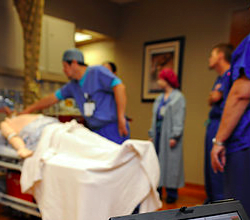Healthcare professionals are facing a growing challenge with work-life balance as the demands of their jobs often lead to burnout and reduced job satisfaction. Using assistants (VAs) in healthcare is a remedy to address these issues.
DocVA VAs enable healthcare workers to focus on patient care and wellness by handling tasks and streamlining processes. This article delves into the importance of work-life balance in healthcare, the impact of assistants, and effective implementation strategies.
In healthcare, work-life balance is crucial for professionals to maintain a relationship between their work responsibilities and personal lives. Healthcare workers frequently endure high-pressure hours and emotional stress from caring for patients, factors that can contribute to burnout. A balanced work-life approach does not benefit the well-being of healthcare professionals. It also enhances patient outcomes and boosts overall workplace morale.
Healthcare professionals face a variety of challenges that can impact their ability to maintain a work-life balance, which include the following:
- Hours and Shift Work: Many healthcare environments require employees to work shifts, which can disrupt personal time and relationships. A high workload triples the risk of burnout in healthcare.
- Emotional and Mental Strain: Dealing with patients and high-stress situations takes a toll on professionals, leading to mental exhaustion that may hinder their ability to relax outside of work.
- Administrative Responsibilities: Healthcare workers often find themselves overwhelmed with duties like scheduling, billing, and documentation, which can limit their opportunities for self-care or spending time with family.
- High-Performance Expectations: The demand for delivering care and meeting the standards set by patients and employers can create a sense of workaholism among professionals, blurring the boundaries between their personal lives.
The Impact of Assistants in the Healthcare Sector
Assistants are crucial in enhancing the balance between work and personal life for healthcare professionals. By utilizing technology and remote assistance, VAs offer an array of services that help alleviate the workload on healthcare providers, allowing them to prioritize their core responsibilities and well-being.
Here are some ways in which VAs can support healthcare practitioners:
1. Administrative Assistance
A Virtual Medical Assistant can manage duties such as scheduling appointments, handling emails, and processing documentation. By delegating these tasks to VAs, healthcare professionals can dedicate time to patient care rather than being overwhelmed by office responsibilities.
2. Patient Engagement
Effective communication with patients is essential in healthcare settings. VAs can handle follow-ups, address inquiries, and even conduct telehealth consultations, ensuring that patients receive support without burdening healthcare staff.
3. Data Handling
In today’s data-driven world, VAs play a role in maintaining records, updating electronic health systems, and ensuring compliance with regulations. This not only enhances efficiency but also eases the cognitive burden on healthcare providers.
4. Project Coordination
Healthcare projects often require Collaboration among teams. VAs can assist in managing project schedules, coordinating meetings, and monitoring progress toward project goals.
Organizational support enhances the efficiency of healthcare teams and reduces stress levels among its members.
Here are some practical tips for incorporating assistants into healthcare settings:
1. Assessing Needs and Tasks
Healthcare professionals should evaluate their responsibilities to pinpoint areas where virtual assistants can offer value. This may involve handling work, managing schedules, or communicating with patients. By prioritizing these tasks, virtual assistants can effectively lighten the workload.
2. Selecting the Appropriate Virtual Assistant
Choosing an assistant with skills is essential. Healthcare-specific virtual assistants often possess knowledge of terminology and compliance standards, making their integration and communication smoother.
3. Providing Training Programs
Training the assistant on the healthcare provider’s workflow, tools, and protocols is crucial for integration. This ensures that the assistant can seamlessly blend into the team dynamics and adapt to workplace requirements.
4. Promoting Collaboration
Encouraging communication between assistants and healthcare professionals fosters teamwork. Regular updates, tools, and defined expectations contribute to better synergy and increased productivity.
Regularly evaluating and monitoring assistants’ performance is crucial to ensuring that the setup is delivering the intended advantages. Healthcare professionals should gather feedback from their team members and patients to pinpoint areas for enhancements.
Benefits of Incorporating Assistants for Maintaining Work-Life Balance
- Reduced Workload: Virtual assistants can manage tasks, easing the workload on healthcare staff and allowing them personal time.
- Enhanced Focus on Patient Care: Healthcare workers can prioritize direct patient care by delegating duties to assistants, resulting in higher patient satisfaction and better outcomes.
- Decreased Burnout: Virtual assistants help alleviate some of the pressures related to tasks, thereby reducing the risk of burnout among healthcare professionals.
- Job Satisfaction: Effective balance between responsibilities and personal life often leads to increased job satisfaction among healthcare providers, which translates into improved performance and patient care.
- Flexibility and Scalability: Virtual assistants offer a staffing solution that can adapt based on the requirements of healthcare providers facilitating resource management.
Conclusion
Establishing a work-life balance in healthcare is crucial for ensuring the well-being of healthcare providers and maintaining high-quality patient care standards.
By incorporating assistants into their tasks, healthcare workers can reduce the burdens of their jobs. This improves their capacity to concentrate on well-being and cultivates a more positive work atmosphere. The deliberate use of VAs has the potential to reshape how healthcare professionals navigate their responsibilities, ultimately resulting in a harmonious and satisfying journey within the challenging realm of healthcare.









